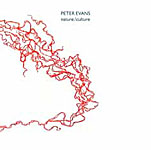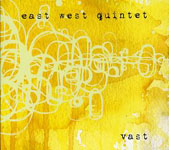Home » Jazz Articles » Album Review » Eleni Karaindrou: Dust of Time
Eleni Karaindrou: Dust of Time
Karaindrou's legacy of six previous releases of film music continues with Dust of Time, her first following the sweeping live performance career retrospective of Elegy of the Uprooting (ECM, 2006). While there's nothing especially new here—Karaindrou's continued integration of traditional Greek folk music and instrumentation into contexts ranging from small ensembles to full symphony orchestras—it's a largely intimate soundtrack that uses more expansive instrumentation sparingly, with violin, violoncello, accordion and harp the dominant voices in this tale of love lost and regained, told over the backdrop of significant 20th Century events including Watergate, Vietnam, the death of Stalin and the fall of the Berlin Wall.
Largely melancholic, it's Karaindrou's remarkable ability to find perfection in the combination of instruments—evoking with the greatest of care the deep yet subtly worn feelings that are at the core of this moving film—that remains her greatest strength. Whether it's the surprisingly gentle combination of piano with string orchestra on the coda ("Adieu") or with full symphony orchestra on the more dramatic "Seeking," it's Karaindrou's skill at working with the power of silence and greater potential of nuance that avoids melodrama and, instead, explores the nooks and crannies of perhaps a narrower range to create great significance with but the sparest dynamic shift.
Karaindrou also knows how to work with stasis. Following violoncellist Renato Ripo's moving solo introduction to "Memories from Siberia" the piece ultimately revolves around a pedal tone, but with the elegant intertwining of violoncello, accordion, French horn, oboe and bassoon, Karaindrou speak volumes with the greatest economy. Gentle beauty comes from violinist Sergiu Nastasa's melancholic theme over Maria Bildes' sparse harp on "Le temps perdu," while Karaindrou's piano creates the simplest of lyrical themes over accordionist Dinos Hadjiordanou's soft cushion.
Just as Angelopoulos' film possesses a clear narrative, so too does Karaindrou's score create an arc all its own. Exploring shades of feeling with an attention to detail that's made her Angelopoulos' scorer of choice since 1986's The Beekeeper, Dust of Time, in its naked exploration of perhaps the most profoundly human emotion of all, is yet another high watermark in a career defined by musical milestones.
Track Listing
Le Temps Perdu; Dance Theme Var II; Notes I; Seeking Var II; Waltz by the River; Unraveling Time I; Tsiganiko; Dance Theme Var I; Seeking; Memories from Siberia; Uraveling Time II; Notes II; Tsiganiko II; Seeking Var I; Dance Theme; Le mal du pays; Nostalgia Song; Solitude; Adieu.
Personnel
Sergiu Nastasa: violin (1, 5, 7, 8, 11, 13, 18); Renato Ripo: violoncello (2, 7, 10, 11, 13, 16, 17); Maria Bildea: harp (1, 2, 5, 6, 7, 8, 11, 13); Vangelis Christopoulos: oboe (2, 6, 8, 10, 17); Spyros Kazianis: bassoon (2, 6, 8, 10, 11, 17); Antonis Hadjiiordanou: French horn (8, 10); Dinos Hadjiiordanou: accordion (2, 3, 5-8, 10-13 ,16); Eleni Karaindrou: piano (3, 6, 12, 19); Camerata, Friends of Music String Orchestra (2, 4, 6, 14, 19); Natalia Michailidou: piano (9, 15); Hellenic Radio Television Symphony Orchestra, conducted by Alexandros Myrat (9, 15).
Album information
Title: Dust of Time | Year Released: 2009 | Record Label: ECM Records
Tags
PREVIOUS / NEXT
Support All About Jazz
 All About Jazz has been a pillar of jazz since 1995, championing it as an art form and, more importantly, supporting the musicians who make it. Our enduring commitment has made "AAJ" one of the most culturally important websites of its kind, read by hundreds of thousands of fans, musicians and industry figures every month.
All About Jazz has been a pillar of jazz since 1995, championing it as an art form and, more importantly, supporting the musicians who make it. Our enduring commitment has made "AAJ" one of the most culturally important websites of its kind, read by hundreds of thousands of fans, musicians and industry figures every month.





















